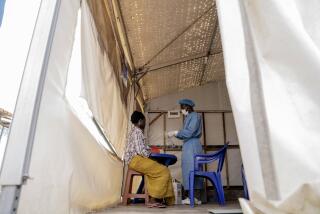U.S. Readies Smallpox Attack Plan
- Share via
WASHINGTON — Warning that even a single case of smallpox could be interpreted as an attack on the nation, federal health officials on Monday sent states detailed plans for emergency mass vaccinations against the disease.
Although smallpox was eradicated globally in the late 1970s, rising concerns about its potential use in bioterrorism or biological warfare have prompted federal officials to beef up the nation’s defenses. While the document sent to state and local health officials lays out plans for vaccinating the entire U.S. population, the federal government has not decided which Americans should be inoculated in advance of any sign that the disease has reappeared.
If a case of smallpox arose, officials at the national Centers for Disease Control and Prevention said, one of the first jobs would be to determine the cause. But given that the disease has not surfaced in more than two decades, “we would act, at this point, as if ... the nation were under attack and would immediately implement the response plan,” said Dr. David Fleming, deputy director for science and public health at the CDC, which developed the plan.
Public health officials would first vaccinate and monitor the sick and anyone who had close contact with them after the onset of fever. These vaccinations would be voluntary, said Dr. Walter Orenstein, director of the CDC’s National Immunization Program. But officials “would have to work with people who refused vaccination” to ensure that if they became ill they would not have contact with anyone else.
Depending on circumstances, state and federal officials could then authorize voluntary vaccinations for a broader set of people, potentially including all 288 million Americans.
The plan explains how a local clinic should deploy staff for everything from medical exams to traffic flow to vaccinate 1 million people in 10 days. But officials said the actual time to vaccinate the public would depend on circumstances.
“Our goal would be to protect as many people as possible, with the first part of the vaccination campaign being directed specifically at those who were at highest risk,” Fleming said.
The vaccine can still provide protection even if given a few days after a person is exposed. Officials assume that anyone at risk would want to be vaccinated.
The plan does not settle the question of whom to “prevaccinate.” The Bush administration is still debating the issue. An advisory panel this summer recommended against mass vaccinations and instead said that shots should be given to 15,000 emergency and health workers, who would likely be first to see an infected person.
The question of whom to inoculate in the absence of an explicit threat is tricky. Smallpox is fatal in about 30% of cases, and the disease can leave survivors with extensive scars. Most Americans are thought to have no immunity. Routine vaccinations stopped in the early 1970s. The smallpox vaccine is effective for up to 10 years with the initial shot. With a booster, it is effective for at least 10 more years.
But the shots come with health risks, including an estimated 1 death per 1 million vaccinations, according to studies conducted in the 1960s. Because of the large number of people with compromised immune systems today, including the elderly and those who are HIV positive, a mass vaccine program could cause scores of fatalities. The vaccine uses a live virus related to the smallpox virus.
Public health officials have increasingly worried that hostile nations are developing weapons using smallpox-like viruses, or else have obtained some of the few remaining samples that have been kept for research purposes and vaccine development. Russia and the U.S. are known to house such samples.
Tommy G. Thompson, secretary of the Department of Health and Human Services, the CDC’s parent agency, said last year that the government would order enough vaccine to protect “every man, woman and child in America.”
The government has more than 100 million doses of an old vaccine and has been studying whether they would remain effective if diluted and used to vaccinate a larger number of people. “If we were to see smallpox tomorrow, we have access to vaccines that we feel could support mass vaccination, if we had to on an emergency basis,” said Joseph Henderson, the CDC’s associate director for bioterrorism preparedness.
Henderson added that some states had already submitted smallpox response plans to the CDC for review, and that those states may hold exercises to test their ability to carry out the plans.
But many states are swamped as they try to prepare for a variety of potential terrorist threats. “So they are very, very busy on many, many fronts dealing with building the public health infrastructure to respond,” Henderson said.
More to Read
Sign up for Essential California
The most important California stories and recommendations in your inbox every morning.
You may occasionally receive promotional content from the Los Angeles Times.













